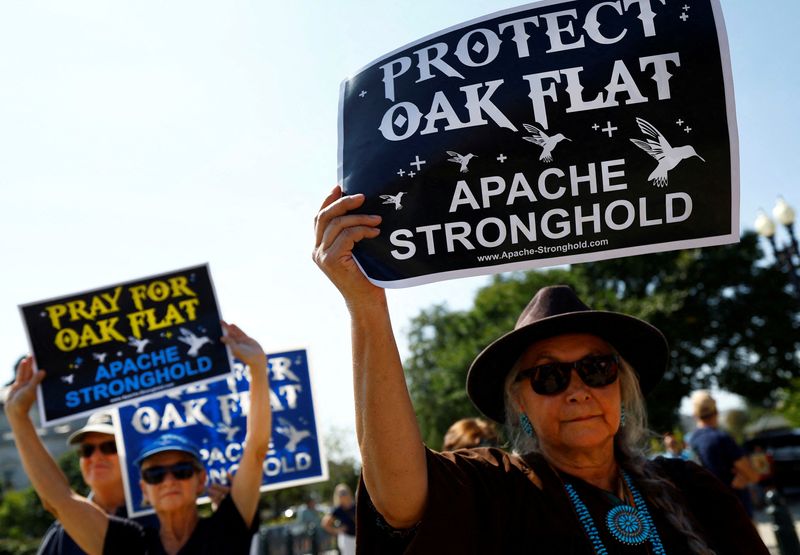By Ernest Scheyder
(Reuters) - A Native American group on Wednesday asked the U.S. Supreme Court to block Rio Tinto (ASX:RIO) and BHP (ASX:BHP) from gaining access to Arizona land needed to build one of the world's largest copper mines, a last-ditch legal move in a long-running case pitting religious rights against the energy transition.
Apache (NASDAQ:APA) Stronghold, a nonprofit group comprised of Arizona's San Carlos Apache tribe and conservationists, asked the court to overturn a March ruling from a sharply divided San Francisco-based 9th U.S. Circuit Court of Appeals allowing the federal government to swap acreage with the mining companies for their Resolution Copper project.
The appeal to the nine justices was delivered in person by a courier after the Apache held a ceremony of prayer and dancing on the court's steps in Washington, the culmination of a months-long caravan from their Arizona reservation to the capital.
At least four justices would need to agree to hear the appeal, in which Apache Stronghold and their attorneys at the Becket Fund for Religious Liberty contend the government would be violating the First Amendment's guarantee of freedom of religion if the mine is developed.
If the court agrees to hear the case, it could hold oral arguments in its term which begins next month and potentially issue a decision by next June.
The dispute centers on the federally owned Oak Flat Campground, known as Chi’chil Biłdagoteel in the Apache language and where many Apache worship their deities. The site sits atop a reserve of more than 40 billion pounds (18.1 million metric tons) of copper, a crucial component of electric vehicles and nearly every electronic device.
If a mine is built, it would create a crater 2 miles (3 km) wide and 1,000 feet (304 m) deep that would destroy that worship site.
In 2014, Congress and then-President Barack Obama approved a complex deal to give Rio Tinto the land. President Joe Biden froze the land swap after assuming office in 2021.
The U.S. Department of Justice, controlled by Biden, has argued in court that the government has the right to give away its land to whomever it chooses, regardless of the religious implications.
"That legal argument is astonishingly broad and harmful to Native Americans and people of all faiths," said Luke Goodrich, a Becket attorney who is leading the appeal.
Rio Tinto said the case "does not present any question worthy of Supreme Court review" given the 9th Circuit's ruling, which it supported.
"This case is about the government's right to pursue national interests with its own land, an unremarkable and longstanding proposition that the Supreme Court and other courts have consistently reaffirmed," said a Rio Tinto spokesperson.
BHP, which owns 45% of the project to Rio Tinto's 55%, declined to comment.
Both companies have spent more than $2 billion on the project without producing any copper.

The date of the appeal was due to a fluke of the court's calendar and not meant to coincide with the anniversary of the Sept. 11 attacks, attorneys said.
Still, the date does coincide with the four-year anniversary of when Rio Tinto fired its former CEO for inadequate consultation with Indigenous groups in Australia.